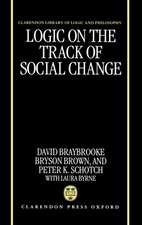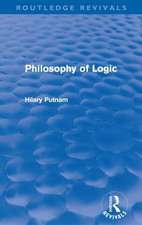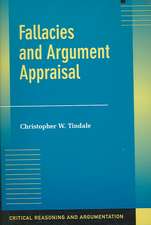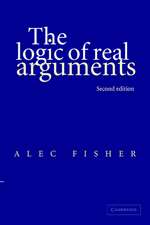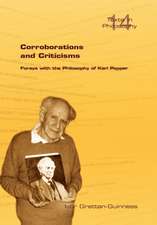Studies in Inductive Probability and Rational Expectation: Synthese Library, cartea 123
Autor Theo A. F. Kuipersen Limba Engleză Paperback – 21 apr 2014
Din seria Synthese Library
- 15%
 Preț: 638.43 lei
Preț: 638.43 lei - 18%
 Preț: 989.98 lei
Preț: 989.98 lei - 15%
 Preț: 596.69 lei
Preț: 596.69 lei - 18%
 Preț: 903.93 lei
Preț: 903.93 lei - 15%
 Preț: 586.88 lei
Preț: 586.88 lei - 15%
 Preț: 696.50 lei
Preț: 696.50 lei - 18%
 Preț: 892.90 lei
Preț: 892.90 lei - 15%
 Preț: 643.34 lei
Preț: 643.34 lei -
 Preț: 282.33 lei
Preț: 282.33 lei - 5%
 Preț: 372.19 lei
Preț: 372.19 lei -
 Preț: 443.10 lei
Preț: 443.10 lei - 15%
 Preț: 637.59 lei
Preț: 637.59 lei - 18%
 Preț: 958.88 lei
Preț: 958.88 lei - 15%
 Preț: 642.36 lei
Preț: 642.36 lei - 18%
 Preț: 1230.66 lei
Preț: 1230.66 lei - 15%
 Preț: 642.83 lei
Preț: 642.83 lei - 18%
 Preț: 1000.39 lei
Preț: 1000.39 lei -
 Preț: 389.70 lei
Preț: 389.70 lei - 15%
 Preț: 637.28 lei
Preț: 637.28 lei - 18%
 Preț: 952.26 lei
Preț: 952.26 lei - 18%
 Preț: 1231.32 lei
Preț: 1231.32 lei - 15%
 Preț: 645.96 lei
Preț: 645.96 lei -
 Preț: 395.85 lei
Preț: 395.85 lei -
 Preț: 400.47 lei
Preț: 400.47 lei - 18%
 Preț: 1225.48 lei
Preț: 1225.48 lei - 15%
 Preț: 638.89 lei
Preț: 638.89 lei - 18%
 Preț: 1232.09 lei
Preț: 1232.09 lei -
 Preț: 394.87 lei
Preț: 394.87 lei - 15%
 Preț: 640.37 lei
Preț: 640.37 lei - 15%
 Preț: 639.08 lei
Preț: 639.08 lei -
 Preț: 381.98 lei
Preț: 381.98 lei - 15%
 Preț: 643.00 lei
Preț: 643.00 lei - 15%
 Preț: 672.29 lei
Preț: 672.29 lei
Preț: 380.45 lei
Nou
Puncte Express: 571
Preț estimativ în valută:
72.81€ • 75.73$ • 60.11£
72.81€ • 75.73$ • 60.11£
Carte tipărită la comandă
Livrare economică 14-28 aprilie
Preluare comenzi: 021 569.72.76
Specificații
ISBN-13: 9789400998322
ISBN-10: 9400998325
Pagini: 172
Ilustrații: XII, 154 p.
Dimensiuni: 152 x 229 x 9 mm
Greutate: 0.24 kg
Ediția:Softcover reprint of the original 1st ed. 1978
Editura: SPRINGER NETHERLANDS
Colecția Springer
Seria Synthese Library
Locul publicării:Dordrecht, Netherlands
ISBN-10: 9400998325
Pagini: 172
Ilustrații: XII, 154 p.
Dimensiuni: 152 x 229 x 9 mm
Greutate: 0.24 kg
Ediția:Softcover reprint of the original 1st ed. 1978
Editura: SPRINGER NETHERLANDS
Colecția Springer
Seria Synthese Library
Locul publicării:Dordrecht, Netherlands
Public țintă
ResearchCuprins
1. Introduction.- 1. Concept Explication.- 2. Objectives and Survey.- 2. Cognitive Rationality.- 1. On the Explication of the Concept of Rationality.- 2. Cognitive Rationality and Patterns of Expectation.- 3. Inductive Reasoning and Inductive Probability Theory.- 3. Logico-Mathematical Preliminaries.- 1. Logical Vocabulary.- 2. Set-theoretical Vocabulary.- 3. Some Elements of Probability Theory.- 4. Formally Rational Expectation in a Paradigmatic Context.- 1. Paradigmatic Contexts.- 2. Two Conditions for Rational Expectation.- 3. A Framework for a Paradigmatic Context.- 4. First Analysis of a Rational Expectation Pattern.- 5. A Framework for a Paradigmatic Context (continued).- 6. Third Formal Condition for Rational Expectation.- 7. Decidable Contexts.- 5. Generalized Carnapian Systems.- 1. Introduction.- 2. Constitutive Principles and Definition of GC-systems.- 3. General Analysis of GC-systems.- 4. Analysis of Positive Inductive GC-systems (0 < ? < oo).- 5. Analysis of Negative Inductive GC-systems (? < 0).- Appendix to Section 2 (Proof of T2).- 6. Hintikka and Universalized Carnapian Systems.- 1. Introduction.- 2. NH-systems.- 3. Hintikka-systems (H-systems).- 4. Some Fundamental Properties of H-systems.- 5. An Urn-model for H-systems.- 6. The Equivalence of NH- and SH-systems: Universalized Carnapian systems (UC-systems).- 7. Analysis of UC-systems.- 8. Fundamental Discussion Related to Applications.- 9. Finite Parameters for H-systems.- 10. Reformulation of H-systems; k ? ?.- 11. GH-systems and G UC-systems.- 12. Survey of Systems.- Appendix to Section 2 (Proof of T1 ).- 7. Rational Expectation in Multinomial Contexts.- 1. Carnap’s Intended Application.- 2. The Multinomial Context.- 3. Formally Rational Patterns for Open Multinomial Contexts.- 4. MaterialConditions of Adequacy; UC-systems as Expectation Pattern for Open Multinomial Contexts.- 5. Constitutional Distributions for Open Multinomial Contexts.- 6. The Hypergeometric Context.- 8. Some Problems and Related Topics.- 1. PER-systems.- 2. On Weakening WPERR.- 3. *UC*-systems and k ? ?.- 4. Confirmation Theory.- 5. Falsification.- 6. Rules of Acceptance in UC-systems.- 9. Concluding Remarks.- References.- Index of Names.- Index of Subjects.- Recurring Symbols.- Conditions/Principles/Axioms.- Definition of Systems.
Notă biografică
Professor Theo Kuipers is the author of From Instrumentalism to Constructive Realism (Synthese Library 287, 2000). He is the leader of the Groningen Research Group `Cognitive Structures in Knowledge and Knowledge Development', which gained the highest possible scores in two successive assessments of Dutch philosophical research by international committees.

